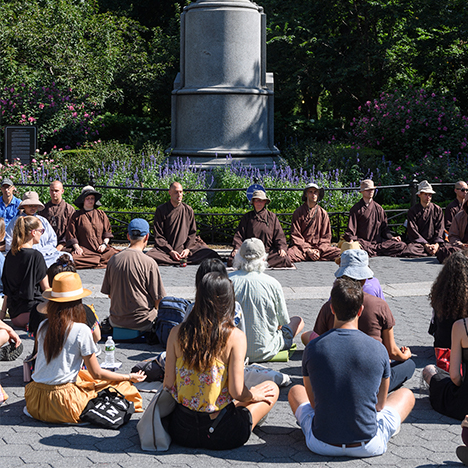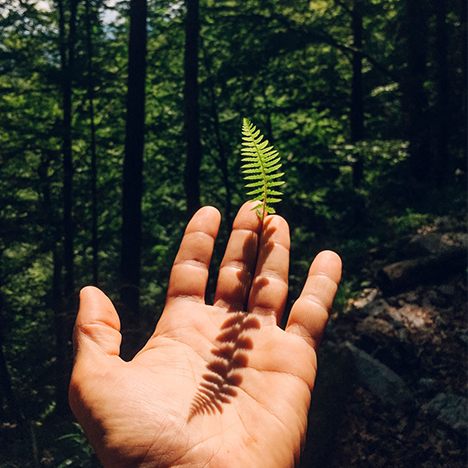
Thich Nhat Hanh meditating with Br Phap Huu, Plum Village, France. © Speakit Productions Ltd.

Thich Nhat Hanh meditating with Br Phap Huu, Plum Village, France. © Speakit Productions Ltd.
In 2017 the Rubin screened Walk With Me, the documentary about Zen Buddhist master Thich Nhat Hanh and Plum Village, his monastic community in rural France. The movie immerses viewers in the sights, sounds, and daily rituals of the community, and some people find that watching it can be a quasi-meditative experience. But it doesn’t delve into the fascinating life and work of Thich Nhat Hanh, including his philosophy of Engaged Buddhism and environmental advocacy.
Thich Nhat Hanh’s ideas about Engaged Buddhism started taking shape when he was a peace activist during the Vietnam War. “When bombs begin to fall on people, you cannot stay in the meditation hall all of the time,” he said in an interview with Lion’s Roar magazine. “When I was a novice in Vietnam, we young monks witnessed the suffering caused by the war. So we were very eager to practice Buddhism in such a way that we could bring it into society. That was not easy because the tradition does not directly offer Engaged Buddhism. So we had to do it by ourselves. That was the birth of Engaged Buddhism.”

Photograph by Filip Wolak
Essentially, Engaged Buddhism means connecting individual meditation practice to global ethics and social action. “Meditation means to be aware of what is happening in the present moment—to your body, to your feelings, to your environment,” he said in an interview with Tricycle magazine. “But if you see and if you don’t do anything, where is your awareness? Then where would your enlightenment be? Your compassion?” This general idea is fleshed out in the Five Mindfulness Trainings, which distill teachings of the Buddha into concrete, nonsectarian guidelines for mindful living in the modern world. You can read about them in detail on the Plum Village website.
The Fifth Mindfulness Training, which relates to mindful consumption, has the greatest relevance to environmental sustainability. “I will contemplate interbeing and consume in a way that preserves peace, joy, and well-being in my body and consciousness, and in the collective body and consciousness of my family, my society and the Earth.” On an individual level, this can mean eating less meat or none at all, in order to promote your own health and prevent cruelty to animals. Eating less meat also has a global environmental impact, since raising livestock consumes more natural resources than raising grains or vegetables. This same general principle applies to all sorts of consumption, from fuel to electronic gadgets, to extra food you might want but not need.

This approach has fueled Thich Nhat Hanh’s impressive work as an advocate for the environment. In 2015 he and other Buddhist leaders, including the Dalai Lama, made a shared declaration to world governments in anticipation of the Paris Climate Agreement. He made a similar submission to the United Nations in 2014. He has also written two books about environmental sustainability: the bestseller _The World We Have Now and Love Letter to the Earth_. “The situation the Earth is in today has been created by unmindful production and unmindful consumption. We consume to forget our worries and our anxieties. Tranquilising ourselves with over-consumption is not the way,” he wrote in The World We Have Now. “We have constructed a system we can’t control. It imposes itself on us, and we become its slaves and victims.”
Engaged Buddhism asks us to consume mindfully for our own benefit, so that we can have a healthier body and a deeper awareness of our interconnection with the natural world. It also asks us to take social action to help change the social and economic systems that drive global overconsumption, with Thich Nhat Hanh’s leadership as an example. What can you do to promote mindful consumption, for yourself and for the world?
Get the latest news and stories from the Rubin, plus occasional information on how to support our work.